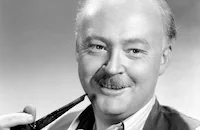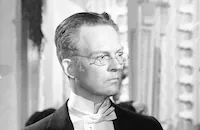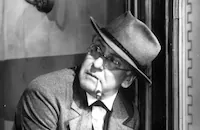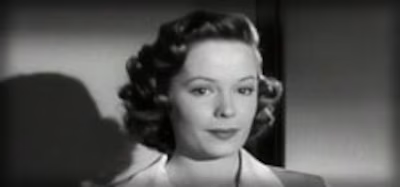The Company She Keeps

Brief Synopsis
Cast & Crew
John Cromwell
Lizabeth Scott
Jane Greer
Dennis O'keefe
Fay Baker
John Hoyt
Film Details
Technical Specs

Synopsis
The moment she learns that she has been paroled from the State Institute for Women, model prisoner Mildred Lynch, who has served two years for check forging, changes her name to Diane Stuart and heads for Los Angeles. Upon arriving, her parole officer, Joan Willburn, escorts her to her new boardinghouse and tells her that she will be working at a local hospital. Diane, who has struggled to overcome a difficult childhood as well as a drinking problem, acts bitterly toward the soft-spoken Joan, but agrees to go out with her that night. While they are dining, Joan notices her boyfriend, reporter Larry Collins, in the restaurant bar and leaves the table to talk to him. After Joan gently turns down Larry's marriage proposal because of the demanding nature of her job, she invites Larry to meet Diane. Before Larry even catches sight of Diane, however, she bolts. When Diane later explains to Joan her fear that people like Larry will label and reject her, Joan advises her not to think like an ex-convict, then informs her that, as a precaution, she has been assigned the hospital's night shift. Though disappointed, Diane dutifully reports to work and there meets fellow parolee Tilly Thompson. While on duty one night, Diane spies Larry visiting his sick boss and connives to meet him. Larry sees through her coy act and snubs her, but the determined Diane soon persuades him to take her out. Diane then asks the unsuspecting Joan for money to buy a new coat, but Joan is unable to accommodate her. Frustrated, Diane considers stealing a coat from a clothing store but stops herself at the last moment. When she returns to her boardinghouse, she finds that Joan has sent her own evening coat for Diane to borrow. Diane's date with Larry does not go well, and Diane, who has not told Larry anything about her past, becomes agitated when he innocently questions her about a purse and some money that has dropped out of her coat pocket. As they are saying goodnight, however, Diane breaks down in tears and apologizes to Larry for trying to manipulate him. Despite this inauspicious start, Larry begins to see Diane in earnest, and the two fall deeply in love. Joan senses that Larry has become interested in someone else, but does not discover the other woman is Diane until she sees her sharing cocktails with Larry at the airport, where he is waiting for a plane. Hurt and concerned, Joan later lectures Diane about becoming involved with a man whose life-style is beyond her means. Adding that Diane has already violated her parole by drinking, Joan then strongly advises her to stop seeing Larry. Soon after, however, Larry telephones Diane at the hospital and asks her to fly to New York to be with him. Without explaining why, Diane tearfully informs him that she cannot leave and hangs up. Undaunted, Larry shows up at Diane's boardinghouse the next day, and Diane gives in to her feelings. When Diane next reports to Joan's office, she breaks down and tells her rival that Larry has proposed. Sensing that Diane truly is in love, Joan bravely endorses the marriage, but reminds her charge that, as a parolee, her plans must first be approved by the parole board, which would contact Larry as a matter of course. Terrified of telling Larry the truth about her past, Diane decides not to file her petition and leaves Joan's office. Soon after, Larry arrives to make a final break with Joan and finally learns about her relationship with Diane. Though surprised, Larry remains devoted to Diane and convinces her to file her petition. At the board meeting, one of the members shows Joan a letter written by Diane, in which Diane reveals Joan's prior romance with Larry and her possible prejudice in the case. Joan is hurt by Diane's lack of trust but continues to champion her in front of the board. After the board decides to postpone making any decisions, Diane accuses Joan of sabotaging the marriage. Then while trying to protect Tilly, who has been stealing drugs from the hospital, Diane is arrested. Aware that Diane will be forced to return to prison because of the arrest, Joan pleads with the judge to be lenient. While awaiting the judge's decision, Diane sneaks away from the courthouse but is followed to the train station by Larry. There, Larry convinces her not to run away, and when Diane returns to the court, she learns that, because of Joan's belief in her, the judge has dismissed the charges against her. Joan then gives Diane and Larry her final blessing, and the couple looks forward to a happy future together.

Director

John Cromwell
Cast

Lizabeth Scott

Jane Greer

Dennis O'keefe
Fay Baker

John Hoyt
James Bell

Don Beddoe
Bert Freed
Irene Tedrow
Marjorie Wood
Marjorie Crossland
Virginia Farmer

Parley Baer
Dick Ryan
Harry Cheshire
Jasper Weldon
Jack Gargan

Kathleen Freeman
Geraldine Carr
Helen Brown
Eileene Stevens
Wanda Tynan
Charles Wagenheim
Frances Driver
Jane Crowley
Royce Milne
Jerry Mullins
Gail Bonney
Sally Corner
David Clarke

Kenneth Tobey
Don Greer
Kate Lawson
Charles Mcavoy
Torben Meyer
Claudia Constant
Yvonne Rob
Gerald Pierce
Paul Lees
Dewey Robinson
William Ruhl
Barry Brooks
Victoria Horne
Maria Costi
Theresa Harris
Adrienne Marden
Virginia Vincent
Hilda Plowright

Don Dillaway
June Benbow
Brick Sullivan
Alyn Lockwood
Forrest Dickson
Eric Alden
Ruth Lee
Joey Ray
Helen Carlson
Mary Alan Hokanson
Ann Howard
Larry Barton
George Volk
Peter Michaels
Fred Hoose

Erskine Sanford
Gertrude Hoffman
Edith Evanson
Elizabeth Flournoy
Frances Morris

Jeff Bridges
Dorothy Dean

Beau Bridges
Lela Bliss
Virginia Mullen
Crew
C. Bakaleinikoff
Mel Berns
James Casey
Albert S. D'agostino
Ketti Frings
Larry Germain
Leigh Harline
Alfred Herman
John Houseman
Nicholas Musuraca
Clem Portman
Sid Rogell
Francis Sarver
Darrell Silvera
Edith Sommer
William Stevens
Robert Swink
Michael Woulfe

Videos
Movie Clip


Film Details
Technical Specs

Articles
11th Annual Noir City, Egyptian Theatre (Los Angeles) - A Report on the 11th Annual Noir City, Egyptian Theatre, Los Angeles, Part 1
Imagine if Out of the Past ended not with Jane Greer's death but with her capture. Imagine if she went to prison and was released on parole years later. And imagine if her parole officer was kindly blonde Virginia Huston, the one who played Robert Mitchum's good-girl lover in that film.... These thoughts came to mind at this screening because Greer's character in the second film is rather similar to that in the first, though she takes the cynicism to much more interesting and personal levels. She's still tough and contemptuous, but her inner shame and self-loathing at having turned out the way she has is equally clear -- and very compelling. Lizabeth Scott, meanwhile, looks, sounds, and behaves very much like Virginia Huston in Out of the Past. Not seeing Out of the Past right before this film, one might not notice the similarities, but seen together, they are striking.
If The Company She Keeps can be called "noir," it's in how Greer feels trapped by her former prison life. She is unable to function like a normal human being and is given to great paranoia. She feels everyone is judging her and thinks less of her because of her past. It's as if in her mind she's still in a noir movie where the world is out to get her, while in reality she is in a normal world that wants to help her. There is more of a plot, involving Greer stealing away Scott's reporter boyfriend (film noir fixture Dennis O'Keefe), but the film is really driven by Greer's character issues.
Greer is excellent in one of her best performances. Scott is fairly sexless and even lifeless in her role, all polished on the outside with little energy on the inside. She doesn't put up much of a fight when she learns her parolee is stealing away her man! The Company She Keeps is definitely worth a look, given the chance.
This viewer, alas, was unable to attend the three biggest rarities of the first festival weekend: Fly-By-Night (1942) from director Robert Siodmak, and two obscure Fox pictures, Roses are Red (1947) and Smooth as Silk (1946). But I was able to catch another: Six Bridges to Cross (1955), a Universal title shown in a newly struck 35mm print. It's not a noir in any way, shape or form, and it's rather talky and flatly directed by Joseph Pevney, but it's notable for Tony Curtis's strong, very affecting performance and also for Sal Mineo's big-screen debut, which is excellent.
Mineo plays the child version of Curtis' character in a tale that spans the Depression era to the modern day (1950s), following the evolving relationship between a Boston cop (George Nader), who works his way up in the force, and a Boston street kid (Mineo), who grows up to be a criminal played by Curtis. Their friendship waxes and wanes over the years. Nader likes Curtis (as everyone does) and tries to help him stay on the straight and narrow, but then gets fed up when Curtis doesn't stay true to his new path and falls back into his old patterns.
Co-starring as Nader's wife is Julie Adams, who was there at the screening and was interviewed afterwards on stage. Adams is spry and energetic at 82, still a working actress, and she had only general memories of Six Bridges to Cross, which she hadn't seen since its release.
The picture was largely filmed in Boston, relatively unusual for a movie of this era, and the locations provide a freshness to a just-OK narrative. Ultimately, the performances of Mineo and Curtis are the best reasons to stick with the film; Curtis in particular, with his hyper desperation, seems to be giving a hint of things to come in Sweet Smell of Success (1957), in which he would deliver perhaps the performance of his career as Sidney Falco.
Convicted
The prison noir Convicted (1950) is the kind of movie one loves to discover at this annual festival of film noir. It's no masterpiece but simply a tough, compelling, well-acted film that is relatively obscure but was presented here in a sharp new 35mm print. Let's just say Convicted goes down real easy.
The third American film version of a 1929 Martin Flavin play (the first two were The Criminal Code [1931] and Penitentiary [1938]), Convicted stars Glenn Ford as a war veteran who accidentally kills a man who was harassing a girl at a nightclub. Ford slugs him but the guy hits his head in the fall and dies. Everyone knows it was an accident, including prosecutor Broderick Crawford, who tries hard to present the case in court in such a way that he will lose and Ford will walk. But Ford's inexperienced and idiotic lawyer blows the case, and Ford is convicted and given a 1-10 year prison term.
After a few years, Ford is still in prison, and Crawford reenters the story as the new prison warden, who moves to the facility with his kind-hearted daughter (Dorothy Malone). As Crawford tries again to help Ford, other inmates plan a breakout and then a murder of another prisoner who ratted on them. Ultimately, Ford must choose whether to give up information that could help set him free but would also break the code of silence all the inmates live by.
What makes Convicted a film noir are the two psychological qualities that mark most noirs: fatalism and alienation. For the first half of the movie, Ford is a classic noir victim of fate -- punished unjustly for a crime he did not commit (or in this case, not to the degree indicated). The world seems out to give him tough breaks for no apparent reason other than that's what the world is like. But then in the second half, when it becomes clear that he will indeed pretty soon get out of prison, the main thrust of his character changes to alienation. He knows he'll be out soon, but who will hire an ex-con? What will he do and where will he go? Suddenly the world just looks uncaring and hopeless.
Such subject matter gives Convicted the opportunity for greatness and profundity, but for that a better director than the mediocre Henry Levin would have been needed. A better filmmaker would have concentrated more on the fatalism of Ford's situation and his ensuing despondence. He would have kept the focus much more on Ford rather than allowing the story to drift into other side plots.
Still, Convicted is good stuff. Much credit has to be given to screenwriter Bill Bowers (one of three credited writers), whose razor-sharp tough-guy talk and flair for comedy writing is unmistakable. His touch is evident from the very opening scene of two detectives humorously arguing over present and past ballplayers, newspapers, and the like. (Their exchange plays like a model for the dialogue in Quentin Tarantino's Pulp Fiction [1994].) Later, when inmate Millard Mitchell tries to dissuade another prisoner from breaking out, he says, in an obvious and vivid Bowers line: "I've seen it before. They bust out eager and come back dead."
Bowers' dialogue and fast-moving story suit Broderick Crawford well, who displays his full no-nonsense persona. Ford, too, delivers one of his usual and excellent studies in quiet fury. He was always good at showing rage behind a calm façade, and Convicted is a good vehicle for him.
With an enjoyable supporting cast of Millard Mitchell, Frank Faylen, Will Geer, Whit Bissell, and Ed Begley, Convicted delivers the goods. If only the intensity of Ford's story had been allowed to develop more oomph!
by Jeremy Arnold

11th Annual Noir City, Egyptian Theatre (Los Angeles) - A Report on the 11th Annual Noir City, Egyptian Theatre, Los Angeles, Part 1
The Company She Keeps
Written by Ketti Frings (who later wrote The Shrike (1955) and Come Back, Little Sheba, 1952), The Company She Keeps was nothing more than a soap opera with its advertising posters proclaiming "She fought for love with KISS, with CUNNING, and with CLAW!" Lizabeth Scott, on loan to RKO from Paramount, wanted an alternative to the stereotypical 'tough' roles she'd been given by playing a sympathetic woman. A softer character needed a softer wardrobe. As designer Michael Woulfe later remembered, "When RKO borrowed Lizabeth Scott for The Company She Keeps, I didn't make any sketches because I assumed she'd bring Edith [Head, Paramount's legendary costumer] with her. When I was called to the producer's office and I didn't have anything, I told Scott this, and she said, 'But I've been trying to get away from Edith Head!' So I designed the whole film and I was trying to get her away from the severely tailored looks (she was playing a probation officer). I found out that we had to get Hal Wallis' approval on everything, even though it was an RKO film, because Scott was under contract to him and he wanted her very tailored! Anyway, after it was over, Scott went back to Paramount and told Wallis she wanted to borrow me for her next picture for him."
The Company She Keeps was not a success and put RKO in the red to the tune of $315,000, due perhaps to the casting. John Reid wrote in his book Your Colossal Main Feature Plus Full Support Program: "It seems incredible that any man would prefer dowdy Jane Greer to stylish Lizabeth Scott, yet that is precisely O'Keefe's choice in this oddly miscast movie! Miss Scott seems a natural for the parolee part and Miss Greer would not have disgraced the role of the parole officer. Yet the casting director has reversed this natural order of succession!"
Bosley Crowther in his New York Times review asked, "What would you do, dear reader, if you were a woman parole officer and one of your charges, just out of prison, stole the love of your fiancé? Would you ship the girl back to the pokey, to do time instead of beating yours, or would you be big and make every effort to help the girl gain her civil rights? This is the big, burning question resolved in The Company She Keeps [...] And we don't think we'll ruin the film for you if we tell you that Lizabeth Scott, who plays the parole officer, does the latter thing. Magnanimously, she arranges for the beautiful parolee, Jane Greer, to obtain clemency so she can be married to the butt of their affections, Dennis O'Keefe. Don't inquire now if it makes sense. That would be slightly absurd. And Miss Scott playing a woman parole officer is the least of its sheer absurdities. The whole picture has, indeed, a flavor of the cheapest and pulpiest romance, typified in the banal flirtation by which Miss Greer and Mr. O'Keefe fall in love. As for its entertainment value, that, we would say, is on a par. Things might have been a little better if Miss Scott had sent Miss Greer back to jail."
The Company She Keeps may not have been one of 1951's more memorable releases, but it did mark the film debut of one-year-old Jeff Bridges, who appears with his nine-year-old brother, Beau, and their mother Dorothy in the train station sequence.
Producer: John Houseman
Director: John Cromwell
Screenplay: Ketti Frings
Cinematography: Nicholas Musuraca
Art Direction: Albert S. D'Agostino, Alfred Herman
Music: Leigh Harline
Film Editing: Robert Swink
Cast: Lizabeth Scott (Joan Wilburn), Jane Greer (Diane Stuart aka Mildred Lynch), Dennis O'Keefe (Larry Collins), Fay Baker (Tilly Thompson), John Hoyt (Judge Kendall), James Bell (Mr. Neeley), Don Beddoe (Detective Jamieson), Bert Freed (Smitty, plainclothesman), Irene Tedrow (Mrs. Seeley), Marjorie Wood (Mrs. Haley), Marjorie Crossland (Mrs. Griggs), Virginia Farmer (Mrs. Harris).
BW-83m. Closed captioning.
by Lorraine LoBianco
SOURCES:
Edith Head by David Cierichetti
Your Colossal Main Feature Plus Full Support Program by John Reid
The Internet Movie Database
The All Movie Guide by Hal Erickson
The Company She Keeps
Kenneth Tobey (1917-2003)
Born in Oakland, California on March 23, 1917, Tobey originally intended to be a lawyer before a stint with the University of California Little Theater changed his mind. From there, he went straight to New York and spent nearly two years studying acting at the Neighborhood Playhouse, where his classmates included Gregory Peck, Eli Wallach and Tony Randall. Throughout the '40s, Tobey acted on Broadway and in stock before relocating to Hollywood. Once there, Tobey soon found himself playing a tough soldier in films like I Was a Male War Bride and Twelve O' Clock High (both 1949); or a tough police officer in Kiss Tomorrow Goodbye and Three Secrets (both 1950). Such roles were hardly surprising, given Tobey's craggy features, unsmiling countenance and rough voice.
Needless to say, no-nonsense, authority figures would be Tobey's calling for the remainder of his career; yet given the right role, he had the talent to make it memorable: the smart, likeable Captain Hendrey in The Thing From Another World (1951); the gallant Colonel Jack Evans in the "prehistoric dinosaur attacks an urban center" genre chiller The Beast from 20,000 Fathoms (1953, a must-see film for fans of special effects wizard, Ray Harryhausen; and as Bat Masterson, holding his own against Kirk Douglas and Burt Lancaster in Gunfight at the O.K. Corral (1957).
Television would also offer Tobey much work: he had his own action series as chopper pilot Chuck Martin in Whirlybirds (1957-59); and had a recurring role as Assistant District Attorney Alvin in Perry Mason (1957-66). He would also be kept busy with guest appearances in countless westerns (Gunsmoke, Bonanza, The Virginian) and cop shows (The Rockford Files, Barnaby Jones, Ironside) for the next two decades. Most amusingly, the tail end of Tobey's career saw some self-deprecating cameo spots in such contemporary shockers as The Howling (1981); Strange Invaders (1983) and his role reprisal of Captain Hendry in The Attack of the B-Movie Monsters (2002). Tobey is survived by a daughter, two stepchildren, and two grandchildren.
by Michael T. Toole
Kenneth Tobey (1917-2003)
Quotes
Trivia
Notes
The working title of this film was The Wall Outside. According to August 1949 Hollywood Reporter news items, RKO head Howard Hughes purchased the rights to a theatrical adaptation of Ketti Frings's screenplay, which was to be produced on Broadway by William Bloomingdale and Hal Roach, Jr. No evidence that the play was ever produced has been found, however. Another Hollywood Reporter news item noted that Hughes bought the film project from Hal Wallis, who reportedly intended it as a vehicle for Barbara Stanwyck. RKO then borrowed star Lizabeth Scott from Wallis' company for the production. In October 1949, Nicholas Ray was announced as the film's probable director.
Jeff Bridges, the son of actors Lloyd Bridges and Dorothy Dean, made his screen debut in the picture. Dean acted in the same sequence as Jeff, as did his brother Beau, marking the first time that the brothers appeared together onscreen. Some scenes were filmed at Union Station in downtown Los Angeles, CA. According to modern sources, the picture lost $315,000 at the box office.

Miscellaneous Notes
Released in United States Winter January 6, 1951
Released in United States Winter January 6, 1951













